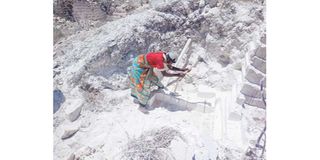Tough times: Of Kilifi mothers digging their way out of misery

Ms Mary Kahunda in the stone mines in the Ngala/Maweni area of Tezo ward, Kilifi North Constituency, on October 29, 2022.
What you need to know:
- Under the sweltering sun, men, women and children work in quarries to eke out a living.
- They wake up at 3am to dig out stones, cut them to size and put them on display for sale.
The dry, rocky and dusty land in the Ngala/Maweni area of Tezo, Kilifi County, is home to hundreds of families.
Here, under the sweltering sun, men, women and children work in quarries to eke out a living. They wake up at 3am to dig out stones, cut them to size and put them on display for sale.
They get Sh4 for every stone sold. Pushed over the edge by poverty and a lack of better jobs, sometimes they have to work day and night to earn more money to meet their needs. Women and children bear the brunt of the tough times.
Ms Mary Kahunda, a single mother of seven, moved from Mavueni village to Roka in 2000 to work in the mines. She separated from her husband when the children were young and life was unbearable for her family.
Hard times
Ms Kahunda says she could not return to her parents with her children for fear of mockery. “My husband could come home after being away and use the little money he got to drink palm wine and not even provide food for our children.”
Her routine work in the mines starts at 3am and ends at 8pm. She pays Sh1,000 monthly for a single-room house adjacent to the quarries.
Her 19-year-old daughter, who dropped out of school after getting pregnant, helps her in the mines. And on Saturdays and Sundays, her 16-year-old son, a pupil at Ngala Primary School, joins them.
“We are suffering and tired with this life competing with men to do this heavy work for many hours to get money for a meal and have sleepless nights to get enough for rent, clothing and other needs.
“It is disheartening when I see my children doing heavy work at a young age and I always feel pain in my chest,” she says.
After spending sleepless nights in the mines, Ms Kahunda must trek for over seven kilometres to fetch water for domestic use. A 20-litre jerrican of fresh water costs Sh60, and women prefer trekking to fetch water to save the fare for food.
“It will cost me Sh100 for one to go with a motorbike to fetch water; now with Sh400 a day, it is hard, and we would contemplate buying food or water at Sh60.”
Great expectations
For now, an NGO has partly come to their rescue. Ms Kahunda is optimistic that her five children, with the help of Nyota ya Asubuhi, will complete their education, get well-paying jobs and help her in future.
The NGO provides meals for vulnerable children every week to discourage them from working in the mines and pays their fees to retain them in school. It also donates relief food to the most vulnerable families.
“I hope my children will get help to finish their education and have a good life, not working in the mines, and relieve me of the heavy work,” she says.
A teenage mother says she dropped out of Ngala Primary School in Standard Seven after getting pregnant. During this interview, she had her three-month-old boy with her in the mines.
Nyota ya Asubuhi is a Catholic agency under the Koinonia community, a humanitarian organisation in Africa under the leadership of Italian missionary Renato Kizito Senana.
The lobby’s official Ken Nyangweso, citing a baseline survey conducted in 2020 in the Kilifi North constituency, says many families are vulnerable, thus exposing young girls to child labour and sexual and gender-based violence, which lead to many cases of teenage mothers, school dropouts and child marriages.
The organisation has mobilised over 100 children, with some benefitting directly from the support. At the weekends, the children meet at its offices for health talks, hygiene and education activities, drawing, reading and sports. The number keeps increasing every weekend because of the breakfast and lunch programme.
“It is hard for you to send a child away if there is something you can offer. The situation is not good, looking at the kind of work parents are doing, tough. Families require houses, food, clothing, water, bedding and school fees for their children.
“The worst bit is that women and children work in the mines trying to get a better life, which is not easy,” he says, adding that children carry the food prepared at the centre to share with their parents and siblings back at home.
Call to action
Mr Nyangweso called on the government and well-wishers to support and empower the community, especially the vulnerable families. “The families are vast in number because the minimum number of children in a family is five, and some have over 10 children.”
Meantime, Nyota ya Asubuhi plans to set up a resource centre to create economic empowerment programmes to improve lives and livelihoods. This follows a positive response from parents and teachers on the engagement of children in different activities that instil good morals and improve their academic performance.





